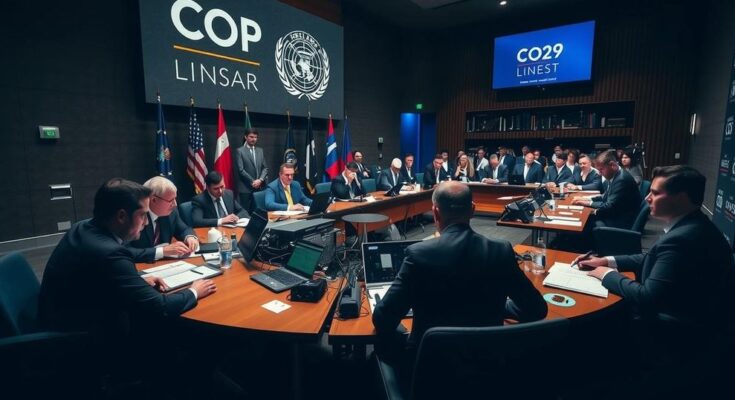At COP29, negotiators are struggling to finalize a climate deal after the G20 summit recognized the need for increased climate financing but left critical issues unresolved. Amidst calls for rich nations to raise their financial commitments, disputes over funding amounts and responsibilities remain. Activists and negotiators express disappointment concerning the lack of direction on fossil fuel transitions, complicating progress in Baku.
Negotiators at COP29 in Azerbaijan are facing challenges as they attempt to reach an agreement following the recent G20 summit declaration which emphasized the need for significant climate finance for developing nations. Although G20 leaders recognized the necessity for trillions in funding, unresolved issues remain regarding the amount, payment responsibilities, and types of financing. Activists have expressed disappointment, noting the declaration did not provide clear direction on transitioning away from fossil fuels, which is crucial for global climate actions. Leading negotiator Yalchin Rafiyev of Azerbaijan described the G20 statement as offering “positive signals,” while UN Climate Chief Simon Stiell underscored the urgency for nations to seek common ground. Brazil’s President Lula da Silva stressed that progress made in Baku must precede next year’s discussions in Belem, Brazil. Rich nations are called upon to elevate their financial pledges from the existing $100 billion annually to enable poorer countries to adapt to climate changes and shift to cleaner energy sources. However, key questions regarding financial implementation were not addressed by the G20, leading some negotiators to express a sense of disillusionment about the summit’s impact on ongoing discussions in Baku. A renewed draft deal on climate finance is anticipated shortly, with developing nations advocating for a commitment of $1.3 trillion per year. Fiji’s Deputy Prime Minister Biman Prasad pointed out the contradiction that annual fossil fuel subsidies amount to $7 trillion. Conversely, developed countries urge the private sector to play an expanded role in financing solutions for climate change, while discussions are also hindered by specific nations’ resistance to acknowledging fossil fuel phase-outs in the negotiations. EU climate envoy Wopke Hoekstra emphasized that backing away from previous commitments is unacceptable for global progress.
The COP29 negotiations in Baku are pivotal, as they follow a G20 summit that acknowledged the funding needs of developing nations while leaving significant questions unanswered. The urgency for climate finance is compounded by the ongoing climate crisis, which disproportionately impacts poorer countries that contribute the least to global emissions. The negotiations focus on whether developed nations can commit to higher climate finance pledges and how to facilitate a transition from fossil fuels to sustainable energy solutions.
In summary, the ongoing COP29 climate negotiations face significant hurdles, compounded by a G20 declaration that, while recognizing the need for enhanced climate financing, failed to provide explicit solutions. As discussions continue in Azerbaijan, the pressure intensifies for developed countries to enhance their financial commitments, while the need for a united approach to climate challenges remains paramount. Without clear actionable plans and commitments, the effectiveness of these talks in addressing global climate issues remains questionable.
Original Source: www.rfi.fr




